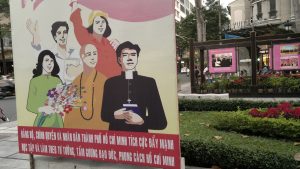What does Asia tell us about the secular ?
Local resources and global exchange in the production of terminology and norms
Program (pdf)
Paris, March 8-9, 2018
EPHE – Site Raspail – Maison des sciences de l’homme
54, boulevard Raspail (room 01)
This global and intra-Asian comparative project brings together a team of specialists to address the question of the secular and secularization in Asia. Insofar as the issue of secularization has become globalized through circulation of notions and norms, many questions arise. To what extent are the notions of secularization and the secular state relevant to Asia? What are the similarities shared by the institutions of Asian nations? What resources in their historical trajectories allowed them or prevented them from appropriating outside concepts? Are the propositions of specialists such as J. Baubérot’s ideal-types of laïcité, or those of Weber and Troelsch on the sociology of religion and modernity) relevant in the situations we observe in Asia? Can the theses of multiple modernities and of multiple secularities account for this diversity?
Organizing committee
P. Bourdeaux (EPHE-GSRL-PSL), E. Dufourmont (Université de Bordeaux-Montaigne, Sciences Philosophie Humanités-EA4574), M.-D. Even (GSRL, CNRS, PSL), A. Laliberté (University of Ottawa), Rémy Madinier (Centre Asie du Sud-Est, EHESS/CNRS, PSL)

PROGRAM
What does Asia tell us about the Secular_ Paris 8_9 March
Thursday, March 8, 2018
8:45 – Morning coffee
9:00 – Introductory remarks
9:15-9:55
• Vincent Goossaert (EPHE, PSL)
The secular and the religious in Chinese modern canons — starting from a case study of Fushou baozang (1936)
9:55-10:35
• JI Zhe (INALCO)
Chinese Interpretations of French secularism at the beginning of the 20th century
Break
10:50-11:30
• Eddy Dufourmont (Université de Bordeaux-Montaigne, Sciences Philosophie Humanités-EA4574)
The historical process of secularization in modern Japan, seen from “Confucianism”.
11:30-12:10
• M.-D. Even (GSRL, CNRS, PSL)
Buddhism, communism, pluralism and the manifold experience of secularizations in twentieth-century Mongolia
12:15-13:30 – Buffet lunch (room 26)
Afternoon
13:30-14:10
• Pascal Bourdeaux (EPHE, GSRL, PSL)
Multiple States, Religions and Modernities for one Nation: Historicizing a converging secularization in 20th Century Viêt Nam
14:10-14:50
• Paul Sorrentino (Centre Asie du Sud-Est, EHESS/CNRS, PSL)
From spirit mediums and fortune to extra-sensorialists and energy: secularisation and the language of the ‘spiritual sciences’ in contemporary Vietnam
14:50-15:30
• Rémy Madinier (Centre Asie du Sud-Est, EHESS/CNRS, PSL)
Pancasila in Indonesia: a “religious laicity” ?
Break
15:45-16:25
• A. Setyo Wibowo (Sekolah Tinggi Driyarkara, Jakarta)
The Catholics reception of Pancasila in Indonesia
16:25-17:05
• Michel Picard (Centre Asie du Sud-Est, EHESS/CNRS, PSL)
Religion and Secularity in Bali
19:15 – Evening meal
Friday, March 9, 2018
8:45 – Coffee
9:00-9:40
• Bénédicte Brac de la Perrière (Centre Asie du Sud-Est, EHESS/CNRS, PSL)
“Religion” as an issue in Burmese political transition: a silent secularity?
9:40-10:20
• Aminah Mohammad Arif (CNRS, Centre d’Etudes de l’Inde et de l’Asie du Sud)
The notion of “secular” in India and other related notions
Break
10:35-11:15
• Murat Akan (Boğaziçi University, Istanbul)
Contested Comparisons: a key to a political field across contexts
11:15-11:55
• Pierre-Jean Luizard (GSRL, CNRS, PSL)
From the Ottoman Tanzimat (1839-1876) to the separation between secularization
and laicization: the capture of a modernization process by foreign powers in the Middle East
12:00 – Buffet lunch (room 20)
Afternoon
13:15-15:15
• Comments and concluding remarks
Peter van der Veer (Max Planck Institute for the Study of Religious and Ethnic Diversity, Göttingen)
Rajeev Barghava (Centre for the Study of Developing Society, Delhi)
Jean Baubérot (GSRL, EPHE, PSL, Paris)
André Laliberté (Université d’Ottawa)
Break
15:30-16:30
• Discussion
What does Asia tell us about the Secular_ Paris 8_9 March